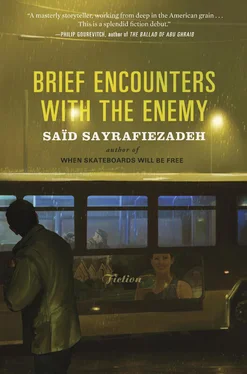“Hey,” I called. I smiled and waved.
He squinted. He seemed to be looking at me and then beyond me. The attitude of haughty disdain that he’d had that day at the bus stop had been replaced by a look of fatigue and befuddlement. I wondered if Quincy and Troy were with him, and I scrutinized the lines of marching soldiers. An instant later, the man I didn’t know had passed, and all I could see was his back, with his enormous pack weighed down by the essentials and an antenna sticking out.
I cried out after him, “I told you there wasn’t going to be a draft!”
In August something strange happened: it got cold. In one day, it plummeted from a record high of 107 to 95 degrees. This felt like relief. But after that the temperature kept dropping, until by the middle of the month it was fifty-three. In the beginning of the cold snap, everyone was happy, and then everyone was scared. Everyone was saying that if it was fifty degrees in August, what was it going to be in December.
Things got busy at work and I didn’t see Roberto for a while. We made plans and I canceled plans, and then we made plans again. He said he really wanted to watch that funny buddy road movie we never got to watch. He said he had my money. All of it. Or almost all of it. I wanted to tell him not to worry about it, that it didn’t matter, but it did matter, and I rationalized that paying me back would help teach him something about responsible American citizenship.
We finally arranged to meet on Saturday morning at ten o’clock.
The night before, I was lying in bed, watching the news about some bad things that had happened in Maple Tree Heights, when it was interrupted by a special report: the war had begun. The invasion was being broadcast live, lots of lights and flashes and little bursts of smoke from afar. Rat-a-tat-tat . Instead of troops landing on the peninsula, as we had been led to believe, they were coming down over the mountains. The peninsula strategy had all been a deft misdirection to fool the enemy. Ten thousand feet high, the mountains were. Up one side and down the other, a hundred thousand troops on the move. It was going to take them a week to make the crossing. What was it like, I wondered, to reach the summit?
I stayed up late, flipping back and forth between channels. The channels all showed the same footage, and all the experts agreed: “Resistance was futile.”
“Ladies and gentlemen,” the newscaster said, “blink and you might miss this war.”
In the morning my car was broken again, it wouldn’t start, and I had to walk to Roberto’s. It was freezing. It might as well have been winter. The sun was hidden and the wind blew hard, whipping the flags around. People drove past me and honked in unity.
When I got to Roberto’s apartment, I was numb. My nose was running and I had to pee. The gate to the cobbler’s was up, but the shop looked unattended. I pounded my hands together and stomped my feet to get the blood going. Five minutes into waiting, I began to suspect that Roberto was about to come around the corner and “surprise” me with another box of electronics. Five minutes after that, I took my chances and shouted up to the window. “ Robbie! ”
Immediately the cobbler came out. He looked at me and sucked in the sides of his cheeks.
“The doorbell doesn’t seem to be working,” I said sarcastically.
He shook his head. “No talk here,” he said. His eyes were tense and bloodshot, and he puffed hard on his cigarette. Smoke billowed out from all the orifices of his face. Beneath his apron, his stomach protruded, firm and round. “Come in store,” he said. “No good talk out here.”
I followed him inside. He put his cigarette in the ashtray and sat down at his machine as if he were about to get back to work. I leaned on the counter like a customer.
“Yesterday,” he said as he rubbed his dirty hands over his face. “Yesterday they come.” He wasn’t looking at me as he spoke. Somehow his dirty hands hadn’t made his face dirty.
“Who come?” I said.
“Oh, no,” he said. He put his black palms up in defense. “I don’t ask question.”
“Who come?” I demanded.
He looked at me with trepidation. Slowly, stumblingly, full of error, he told me that yesterday they come for Roberto, yesterday, middle of day, four car, four car, no warning, all pull up same time, right outside, happen fast, take him way, take him. What I can do? I can do nothing. I am one man. They have law. Hurt me as much as hurt him.
He hunched his shoulders and he looked aggrieved. He was sorry, he said. “I pray for him now.”
I believed him.
“He was nice boy,” he said. “Hard worker. Hurt me too. Oh, boy.” He ran his dirty fingers through his thick hair.
Then some people came in with their shoes, and he stood up to help them. His pack of cigarettes was on the counter, and I took one and stuck it in my mouth and lit it. He didn’t notice. He didn’t care. My boldness surprised me.
I took the long way home. I walked fast and hard. I smoked the cigarette, and the second I exhaled, the cold wind took the smoke. People drove past honking. I came down the hill and over the bridge. At the train tracks I stopped and tried to get my breath. I was wheezing. A small dot appeared way down the line. After a while it became a train. I could hear the rumble. When it drew closer, I could see that it was loaded with long tubular objects, missiles no doubt, twenty feet long, thirty feet, covered with canvas and strapped down with canvas belts. As the train approached, I saw the engineer hanging his head and arm out the window, and I motioned for him to pull the horn as I would have back when I was a kid. A moment later I heard the blast, braaaaaammmmm; it was louder than I had remembered, longer too, and then the train passed under the bridge as it headed out west or down south.
Things were not going as I had hoped. My sole purpose for interrupting my manager at this late hour on this Monday night was to inquire, respectfully, about an increase in my wage. But the conversation had somehow reversed itself, and now here I was standing awkwardly in the doorway of the restaurant office having to defend my very competency at my job. All through my shift I had entertained and distracted myself by imagining the scene in exacting detail: the gentle (or perhaps the assertive) knock on the office door, the disarming smile, the small talk about the weather, and then the casual introduction to the larger issue at hand, the larger issue that I had come to talk about with all reasonableness; the larger issue being eight to ten. That was how I had planned to say it: “I’m looking to move from eight to ten an hour.” Simply put. Or perhaps, I’d thought, I would say, “I’m looking to move to …” Or “I’m looking to move up to, up from , up toward …” Somewhere I had heard that it’s best to put your goals into clear terms, straightforward terms, and that once those goals had been thus stated, all would follow accordingly. In the rare instance that things did not follow accordingly, the onus was, of course, on you and your own ineptitude. I think I had heard it discussed on television. Or I had read it somewhere. Or my father had told me. The counsel had seemed wise at the time, and I’d been determined to remember it if ever an occasion presented itself.
So I stood in the doorway as my manager reclined in his chair with his fingers to his chin, staring up at the dark skylight, where rain was pattering. It had rained every day for a week. They said it was going to rain every day for another week. Fall was always like this in our city. But this fall was worse than others, they said. Soon it would be winter. “Business is bad, Ike,” the manager had told me briskly, effortlessly, as if he had been rehearsing the scene all night long also and was waiting for me to ask so that he could answer and rid himself of the refrain in his head. Not knowing how to respond, I said nothing, one foot crossed uncomfortably in front of the other in what had been, initially, an attempt at bold informality but, as time passed, quickly began to feel like an effeminate posture that would help only in the case against my confidence and assertiveness. And then my manager broke the awful silence by reminding me that two meals were returned by customers that evening. Why had two separate meals been returned, he wanted to know. The clock on his desk read one A.M. I wondered whether, if I had chosen to speak to him earlier that night, he would have been in a different mood, a more conciliatory mood, and would not have dismissed my request so swiftly. Next to the clock were lists of the various ingredients that needed to be ordered; check marks in small boxes indicated the amounts. We dealt in volume: crates, jugs, sacks. The manager’s pen was uncapped. His shirt was white except for a trail of red dots, presumably tomato sauce, running along one sleeve from elbow to shoulder. Or perhaps the dots were blood.
Читать дальше












